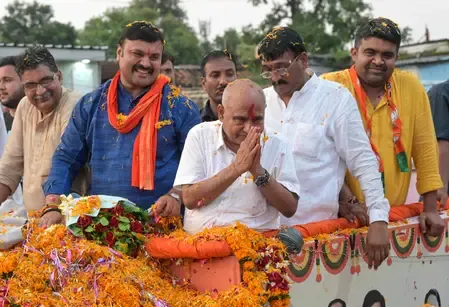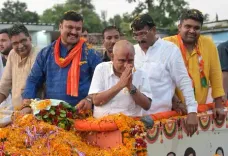Should India Pursue a Comprehensive Population Policy Instead of Control?

Synopsis
Key Takeaways
- Comprehensive population policy is preferred over control.
- Political violence in Bengal is linked to political patronage.
- There is no formal retirement rule within the RSS.
- The RSS aims to establish one lakh shakhas.
- Article 30 needs review for educational rights of minorities.
- Inclusive societal values are emphasized.
New Delhi, Oct 18 (NationPress) The leadership of the Rashtriya Swayamsevak Sangh (RSS) has articulated that India requires a thorough population policy instead of a population control policy, as per insider reports.
The RSS pointed out that political unrest in Bengal is a result of political patronage.
Sources indicate that the RSS urged the public to reflect on the reasons behind political violence in Bengal, highlighting a deficit of Rajdharma in the region. While they expressed dissatisfaction with the state government, they also noted that the Central and State governments should not be viewed as adversaries.
The RSS clarified that the organization does not enforce a formal retirement age. “The Sangh doesn’t have a constitution that mandates retirement at 75. Thus, we cannot impose this on anyone. Every organization should operate independently,” it stated.
Additionally, the RSS accused the West Bengal government of routinely denying permissions for its events, including not allowing Bhagwat ji's sabha, often forcing them to seek legal recourse for permits.
Regarding the BJP's performance in the state, the RSS remarked, “No one anticipated the BJP would secure 72-75 seats in Bengal. That in itself signifies growth. Whether they ascend to power is a different issue.”
Reaffirming its inclusive philosophy, the RSS stated, “Everyone should be able to live freely, but national loyalty cannot be overlooked. Non-Hindus must not face oppression, and Hindus should not be persecuted in Bangladesh.”
According to sources, the RSS advocated for linguistic unity, suggesting there ought to be “one link language” across the country, while acknowledging that “national languages can be numerous.”
They added that the Sangh used to engage in policy dialogues with Congress leaders too. “We would discuss issues concerning Bangladesh and Nepal with Pranab Da,” they mentioned.
On constitutional issues, the RSS indicated that Article 30, which ensures minorities the right to establish and manage their own educational institutions, warrants a reevaluation. “This provision should be amended,” they declared.
Moreover, they emphasized that the Sangh does not regard China as a permanent adversary. “We never assert that we should always be hostile towards China. Maintain relations with all, but the supremacy of the nation is paramount,” they expressed.
Highlighting its expansion strategies, the RSS revealed plans to establish one lakh shakhas by October.









